The Misinformation-Outrage Cycle
This is Part 6. It’s generally best to follow the advice given to Alice and the White Rabbit in Alice’s Adventures in Wonderland: “Begin at the beginning, go on to the end, and then stop.” But if you must read out of order, here are all the links:
- Part 1: There are no Yankees here.
- Part 2: Creating the Conditions for Mainstream Conspiracy Theories.
- Part 3: The Perils of Legal Punditry.
- Part 4: Social Media Makes it Worse
- Part 5: Get the Fighters Fighting and Keep Them Fighting
- Part 6: Invented Narratives and the Outrage Industry
- Part 7: The Outrage Machine Strikes Again: The 14th Amendment Section 3 Debacle
- Conclusion: What To Expect Going Forward
Part 7: The Outrage Machine Strikes Again: The 14th Amendment Trump-Ballot case
I concluded Part III of the Misinformation-Outrage Cycle with this:
The people who demanded accountability faced none for misleading the public.
The show did, indeed, go on. It wasn’t long before the same pundits launched another misinformation-outrage debacle, this time over the Section 3, Fourteenth Amendment Trump-ballot issue.
My purpose is not to analyze whether the Supreme Court reached the correct decision. (If you want to know what I had to say about the issues a few months ago, see this post.)
My purpose is to show you another example of how the partisan pundits who shape the national conversation mislead and misinform the public and then redirect their anger when they are proven wrong.
Before we get started, a word about what lawyers do.
Sometimes lawyers act as advisors. This requires gaming out possibilities and offering clients a realistic assessment of their chances of succeeding in whatever venture (or lawsuit) the client is considering. What are the (realistic) chances of winning? What happens if we lose?
Lawyers prepare for court or write legal documents. This can require a team of lawyers. Depending on the complexity of the case, research and preparation can take weeks or even months.
(This is what is wrong with legal “hot takes.”)
The best lawyers are able to see all sides of issues. They can see what might go wrong. They can see the weakness in their own arguments.
Lawyers act as advocates. When acting as an advocate, the lawyer presents the client’s case in the strongest possible terms. It looks like this, “Your honor, my client has been wrongly accused!” or “The arguments raised by my opponent are without merit and should be rejected!” The goal is to be forceful without being factually wrong.
Lawyers try to predict what courts will do. Nobody gets it right all the time, but the best lawyers are good at predicting what courts will do. Being able to say, “You stand a good chance of losing if you take this to court” can save a client from financial ruin.
Managing expectations: A good lawyer keeps the client’s expectations realistic.
Competent lawyers never confuse legal facts with legal opinions. “We will win this case,” is a legal opinion. “We just won” is a fact.
In Section II of the Misinformation-Outrage Cycle, I quoted Dannagal Goldthwaite Young, a Professor of Communication and Political Scientist, who explained the qualities needed in what she calls “partisan pundits.”
Intellectual humility is the extent to which people are open to the possibility that they might be wrong . . . partisan pundit panels are characterized by performances of intellectual arrogance or “I am not listening because I just want to show I’m right.”
Intellectual arrogance and the attitude that “I’m not listening” and “I refuse to consider the possibility that I am wrong” would make a person insufferable on a legal team — but it plays well on TV.
First, I will analyze the outrage and distortions that surrounded the treatment of the Fourteenth Amendment Section 3 issue in certain media outlets. Then I will analyze those distortions through the lens of what political science professor Jeffrey M. Berry and sociologist professor Sarah Sobieraj conclude in The Outrage Industry.
Timeline of the Fourteenth Amendment, Section 3 debacle
I have found that assembling a timeline is an effective way of showing what happened, so here we go.
December 29, 2020, and January 19, 2021, Law professor Gerald N. Magliocca wrote a detailed paper entitled Amnesty and Section Three of the Fourteenth Amendment outlining the history of Section 3, how it has been applied, and it might in the future be applied. Then he published a similar piece in Lawfare.
Among other things, he addressed the question of whether Section 3 is self-enforcing (which means that it does not require legislation for it to be enforced):
(Note: Not everything in the Constitution is self-executing. See, see this article by law professor David R. Now)
February 4, 2022: This is from law professor, Brian Kalt, who was interviewed for Politifact, said this about section 3:
In the same Politifact piece, Princeton political science professor Keith Whittington observed that Trump was “potentially” among the “likely candidates” who could “reasonably” be kept from office under Section 3:
June 6, 2022: Democracy Docket published an explainer on How the 14th Amendment Could Disqualify Trump and His Allies. Among other things, the article asks: “How does Section 3 apply to those who engaged with the Jan. 6 insurrection?” and concludes that, “Important legal questions remain unanswered.
December 16, 2022: House Democrats introduced a bill to bar Trump from office under the 14th Amendment. The proposed legislation went into detail about how Trump pushed Pence to refuse to certify the election, failed to do anything to stop the mob, etc. (Obviously the bill was never passed.)
If you click through and read the pieces I cited, you’re likely to conclude that the issues in applying section 3 of the 14th Amendment are complex and good arguments could be made on both sides.
August 19, 2023: Laurence Tribe and Judge Luttig publish a piece in The Atlantic with this headline:
The Constitution Prohibits Trump From Ever Being President Again
The subtitle is this:
The only question is whether American citizens today can uphold that commitment.
September 6, 2023: CREW filed a lawsuit to remove Trump from the ballot in Colorado under section 3 of the 14th Amendment. Here is their press announcement. As you would expect from litigants filing a lawsuit and making a press announcement, what they release is powerful advocacy:
So that this section works as a continuation of Section III (about the Garland / DOJ investigation) I will feature many of the same pundits.
Also notice the first comment. After Tribe’s assurance that the evidence is “ironclad,” someone wants to bring the same action in other states.
September 25, 2023: Tribe says, “Watch this case!”
I was told by a former MSNBC viewer that one narrative advanced is that “accountability and justice are just around the corner!” For reasons I have explained elsewhere, the elusive “accountability” will never arrive because the anti-democratic opposition will not disappear. But the promise that soon the foes will be vanquished and the good guys will triumph holds people to their screens. It’s an age-old trick for creating suspense in fiction.
October 2: Nicole Wallace featured a guest who agreed with Judge Luttig:
October 16: Glenn Kirschner says that section 3 of the Fourteenth Amendment is “every bit as vital as the free speech protections.”
Notice one reader’s takeaway.
November 5, 2023: Here Tribe raises the stakes:
November 21: Elie Mystal, in what appears to be a response to Tribe’s question “Will Americans have the courage to keep Trump off the ballot,” says this:
In other words, there is no possibility that the arguments to keep Trump off the ballot are flawed. The only question is whether the courts will have the “courage” to do what is right.
January 3: Pam Keith lists all the people who should “immediately” be disqualified:
Pam Keith then tells her readers that they all engaged in insurrection. (Who needs a judge and jury? Who needs appellate courts! We have lawyers on Twitter and Youtube!)
February 2: Kirschner similarly states that members of Congress he has designated as insurrectionists should not be allowed to exercise their powers as members of Congress:
February 8: Oral arguments at the Supreme Court.
During oral arguments, it was clear to everyone that even the liberal justices (Kagan, Sotomayor, and Jackson) did not believe Trump should be kept off the ballot.
March 4: The Supreme Court handed down its decision. The justices unanimously ruled that section 3 does not keep Trump off the ballot. Four of the justices wrote concurring opinions. A concurring opinion agrees with the majority’s key conclusions but disagrees with the rationale (or something else not key to the central finding).
Part I is a summary of what happened so far in the case.
Part II A offers the history of the section, and why it was added to the Constitution after the Civil War.
Part II B Finds the following:
States may disqualify persons holding or attempting to hold state office. But states have no power to enforce section 3 with respect to federal offices. . .”
After the Civil War (which was, with a few exceptions, the first and only time this section was used until after 2021) the provision was enforced by Congressional Legislation (the Enforcement Act of 1870, which was allowed to expire.)
The section then explains the havoc that might result if individual states had the power to decide that presidential candidates were ineligible for office.
Justice Barrett, in her concurrence, says, “It was not necessary for the majority to address the complicated question of whether federal legislation is the exclusive vehicle through which Section 3 can be enforced.” However, “our differences are far less important than our unanimity: All nine Justices agree on the outcome of this case. That is the message Americans should take home.”
(In other words, she wished the 5 other conservatives had just shut up about whether federal legislation was required so that they could have issued a clean unanimous opinion. She also wished the liberals had been less harsh in their disagreement.)
Sotomayor, Kagan, and Jackson, in their concurrence, think the majority should have stopped with keeping Trump off the ballot and not gotten into the question of how section 3 should be enforced. They quote the Dobbs court saying “If it is not necessary to decide more to dispose of a case than, it is not necessary.” They could have taken this concept from any number of other cases, but for obvious reasons, they chose the Dobbs case.
“In this case,” the three liberal justices wrote, “the Court must decide whether Colorado may keep a Presidential candidate off the ballot on the grounds that he is an oathbreaking insurrectionist and thus disqualified from holding office under Section 3 of the Fourteenth Amendment. Allowing Colorado to do this, we agree, would create a chaotic state-by-state patchwork, at odds with our Nation’s federalism principles. That is enough to resolve the case. Yet the majority goes further.”
They accuse the conservatives of “opining” on which federal actions can enforce section 3.
They stress that all 9 agree on this: “To allow Colorado to take a presidential candidate off the ballot under Section 3 would imperil the Framers’ vision of “a Federal Government directly responsible to the people” and then argue that nothing in the text supports the majority’s opinion about how the issue is to be enforced.”
Basically, they wanted to leave open the question of enforcement.
Can this decision be criticized? Of course. Among other things, it is easy to take the side of the 3 liberals and Justice Barrett and say that the others should have just shut up about how to enforce the provision.
Here is a guess: The justices were trying to get to a consensus with all nine, did the usual circulating of drafts and negotiating language, ran out of time because the Colorado primary was Tuesday, and this is where things were left. With a little more time, they might have reached a full consensus.
The drawbacks to bringing a case to the Supreme Court and losing:
- You can get bad law that wasn’t there before you brought your case. This is why Thurgood Marshall’s team didn’t rush to the Supreme Court in the 1930s with their arguments about why racial segregation was unconstitutional. They built their case slowly to make sure that they didn’t generate precedence against them. It took longer but they reached their goal. Now we may be stuck with the idea that federal legislation is required.
- If you care about partisan politics, you have given Trump lots of airtime to strut around and talk about how his political enemies are so desperate to stop him that they stooped to a ploy that even the three liberal justices rejected. In the eyes of his supporters, this gives credence to his claim that the left is out just out to get him.
I will be blunt: Larry Tribe and Judge Luttig– who said there was no doubt that Colorado had the right to decide whether Trump should be disqualified from office– got their butts kicked by the Supreme Court. Not one of the three liberal justices agreed with them.
Not long after the decision was handed down, I received this in my inbox from The Washington Post (you can read it free through my subscription)
Supreme Court keeps Trump on ballot, rejects Colorado voter challenge
The piece is factual without breathless hype. Readers learn what they need to know:
How did Larry Tribe respond? He dug in. He said the court should have done exactly what all 9 justices, including the three liberal justices, refused to do. (Including a screenshot of Stephanie Jones)
Notice that Larry Tribe is embracing the qualities of a partisan pundit. He didn’t acknowledge that all three liberal justices found his arguments without merit. Instead, he insisted that they are wrong.
(If you are a practicing lawyer and your client loses big in court, saying “The court was wrong!” will not comfort your client or persuade the client to trust you again.)
(What Stephanie Jones is telling Tribe is that there is no authority that allows the Supreme Court to apply a finding in Colorado to the entire country.)
George Conway tells CNN his view of the opinion:
Judge Luttig tells CNN audiences that the decision was all wrong:
Now notice how non-lawyers and partisan outlets ratchet up the rhetoric even higher.
Political podcaster Keith Olberman responded to the Supreme Court’s ruling by saying:
This post received “10K” likes.”
The New Republic ran this headline:
On March 4, shortly after the decision was announced, “Merrick Garland” was trending on Twitter. I was truly bewildered. What on earth did Merrick Garland have to do with the Colorado ballot case? I grabbed one of the tweets that got a lot of attention:
A favorite tactic in this particular echo chamber: If everyone is furious and maybe some liberals created unnecessary outrage, blame Merrick Garland! (Outside a narrow echo chamber, the idea of blaming the attorney general for everything would sound weirdly unhinged.) Recall from Section II that people who engage in conspiracy thinking are constantly looking for ways to assign blame.
When I suggested that the level of rage on social media was the fault of outrage merchants, one person said this to me:

Comparing the 14th Amendment case to the Dred Scott case is Rush-Limbaugh-level crazy.
Here is a sampling of other responses I received:
Wrong, Teri! I’m not not outraged over the 14th Amendment case. I expected that. I am worried about the delays with the immunity case.
Of course, after oral arguments, everyone knew Trump would win. I found it interesting that this person was already on to the next outrage, so I scrolled back through Larry Tribe’s Twitter feed and found this from a few days earlier:
It looks like while waiting for the decision from the Supreme Court (which had to be somewhat nerve-wracking for Tribe after telling everyone that the case was ironclad) he decided to change the subject and stoke outrage at the Supreme Court and redirect rage and fear to the immunity issue.
Someone on Mastodon, after looking at the Supreme Court decision, asked me how Laurence Tribe will react to having egg on his face. I said, “He will never have egg on his face.” He will just swat away any egg that comes his way and try to make it stick to someone else.
I had several people tell me that the idea that legislation is needed to enforce section 3 of the Fourteenth Amendment is absurd. Here is an example of a person mocking the idea of a non-self-executing provision of the Constitution:
“the constitution is unenforceable without popular support” is amongs the realist of realpolitik i’ve heard in my lifetime. . .
Trying to explain that there are provisions of the Constitution that do not need legislation to be enforced would not solve the underlying problem: He will just fall for the next outage.
This person challenged me:
Why should I believe what you say about the 14th Amendment? Why should I assume that you are right and Tribe and Luttig were wrong?
My point is that Tribe and Luttig are not behaving the way an expert should behave. Instead of trying to educate the public about the law and how it works, they are acting like advocates. People think everything Larry Tribe says is true and he lets them think that.
As a result of Tribe’s time on TV and social media, the public is less educated, not more. I consider that a problem.
A different model: Offering facts and giving people the tools to understand them will not fill hundreds of hours of programming and will not keep people glued to the screen. All those clicks and hundreds of hours of viewing time and ratings would be lost.
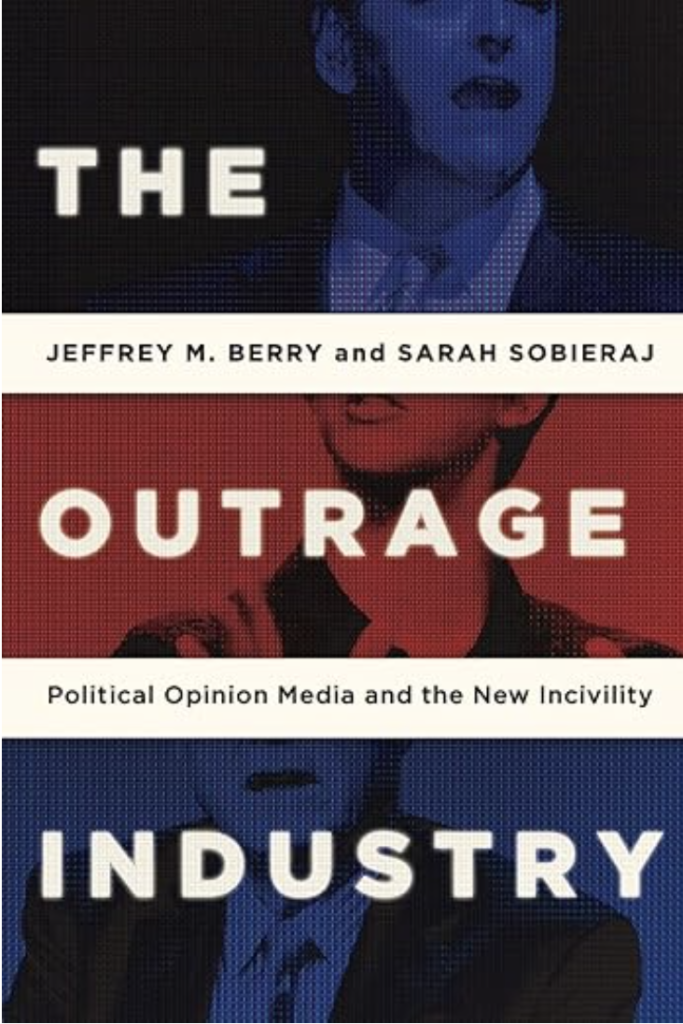
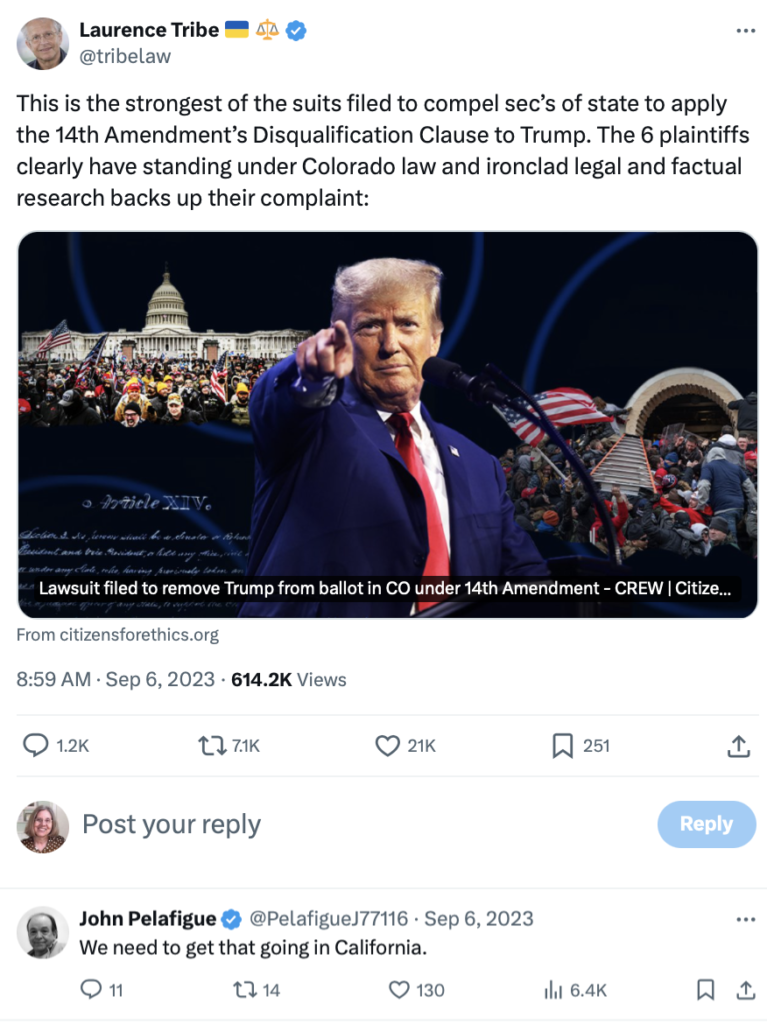
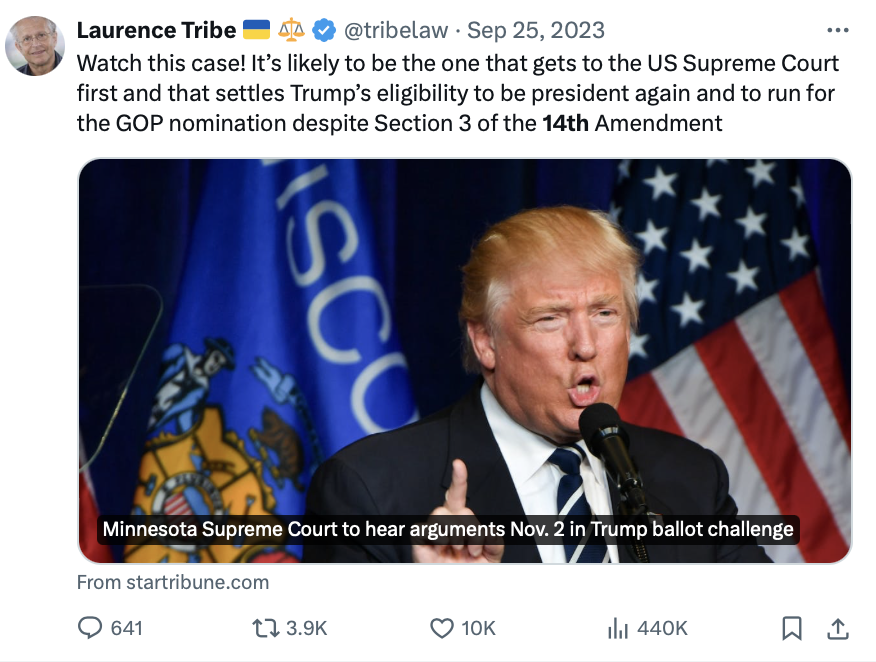
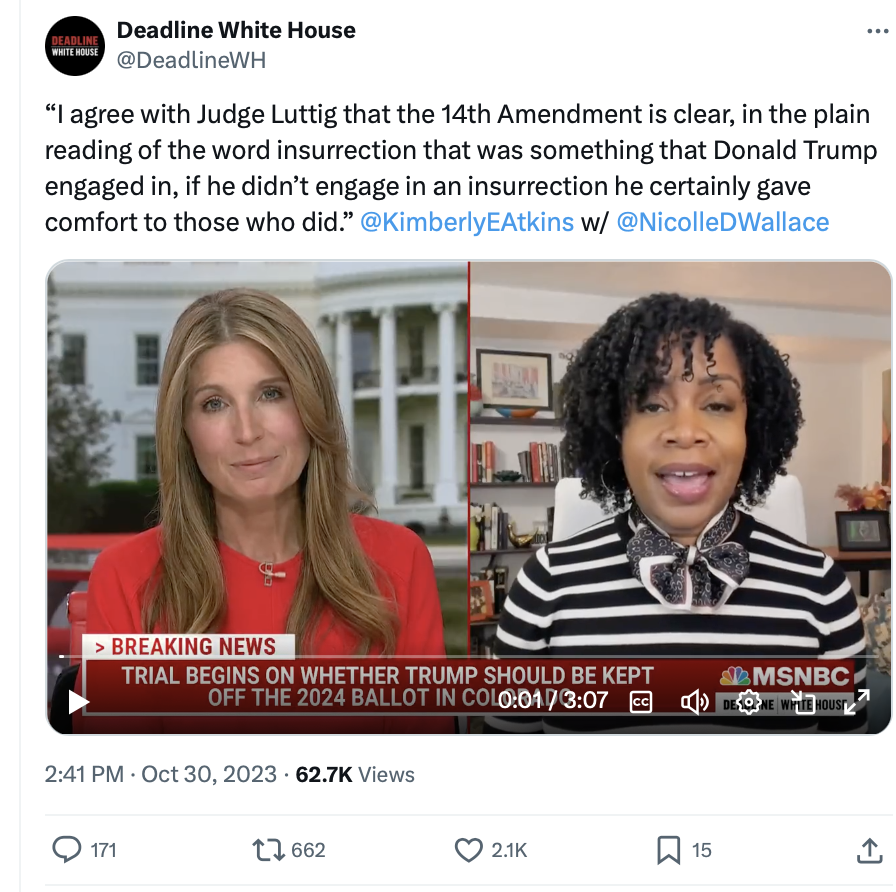
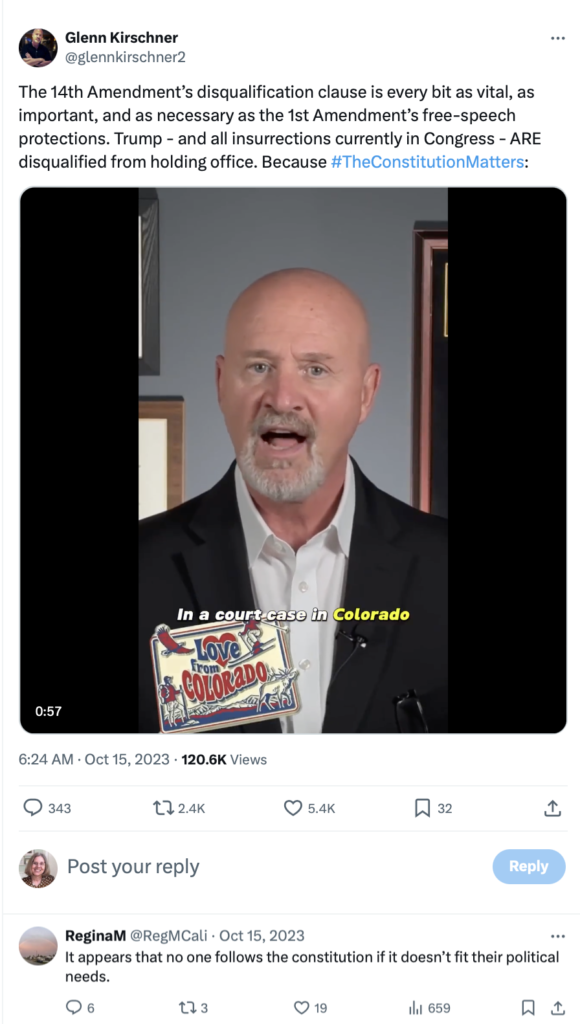
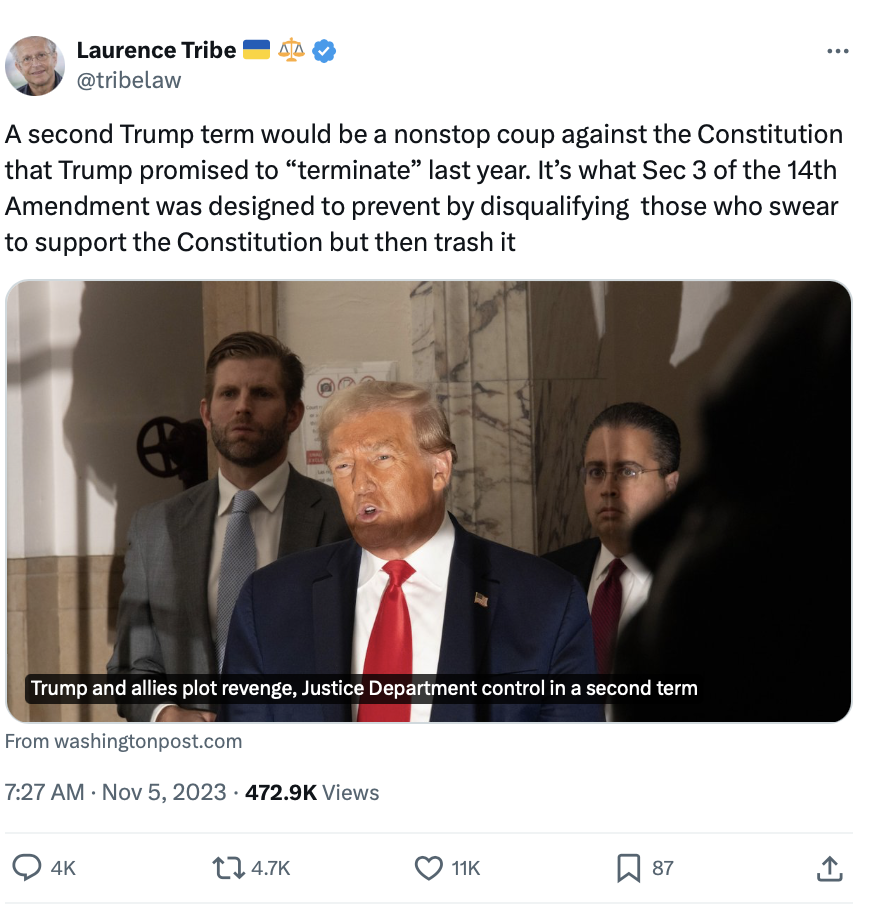
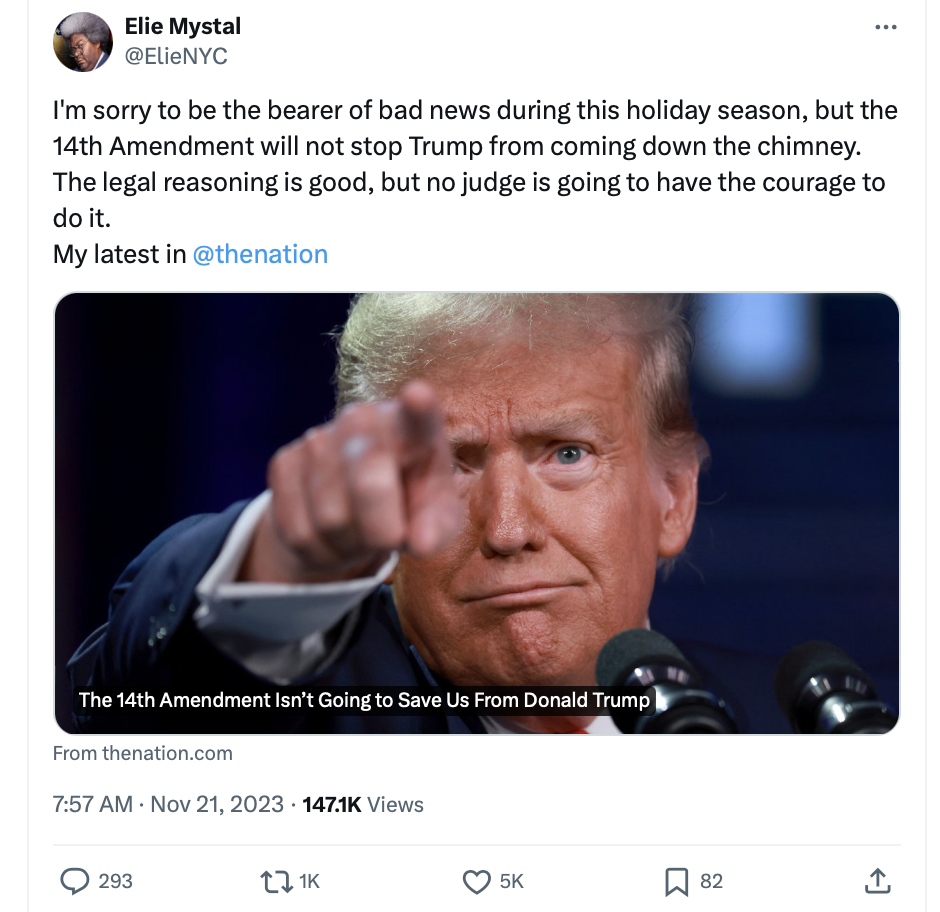
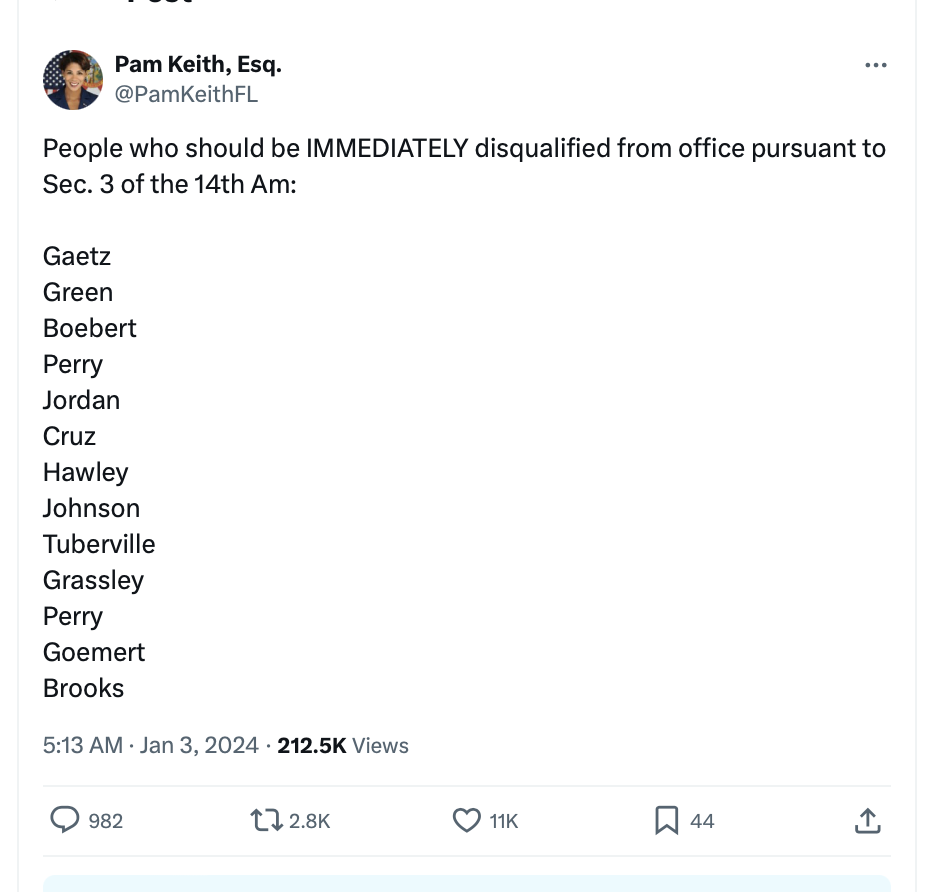

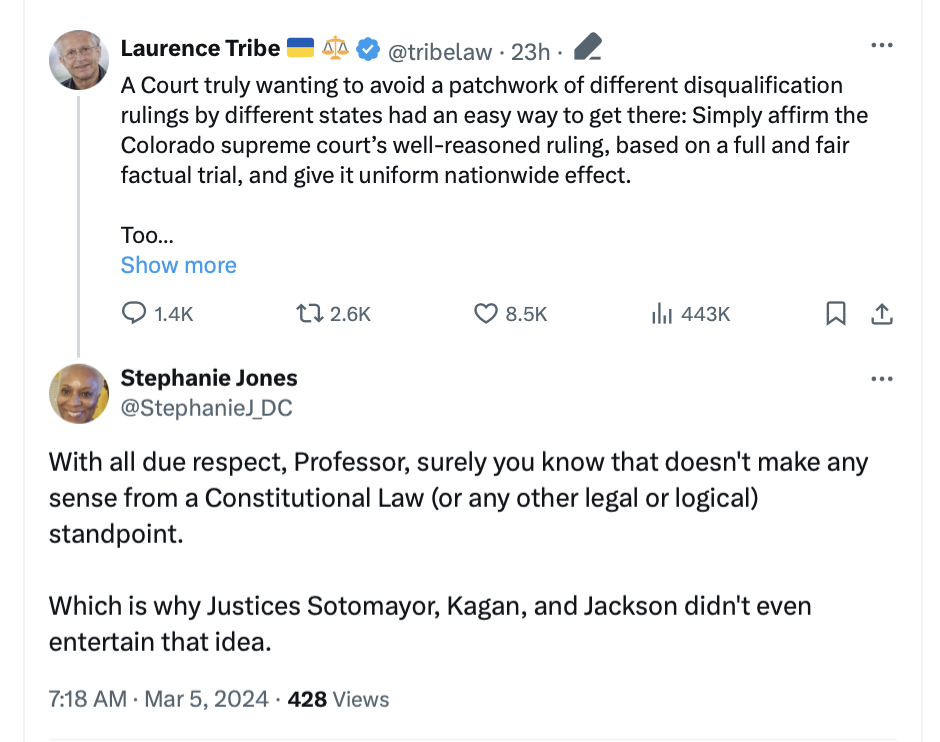
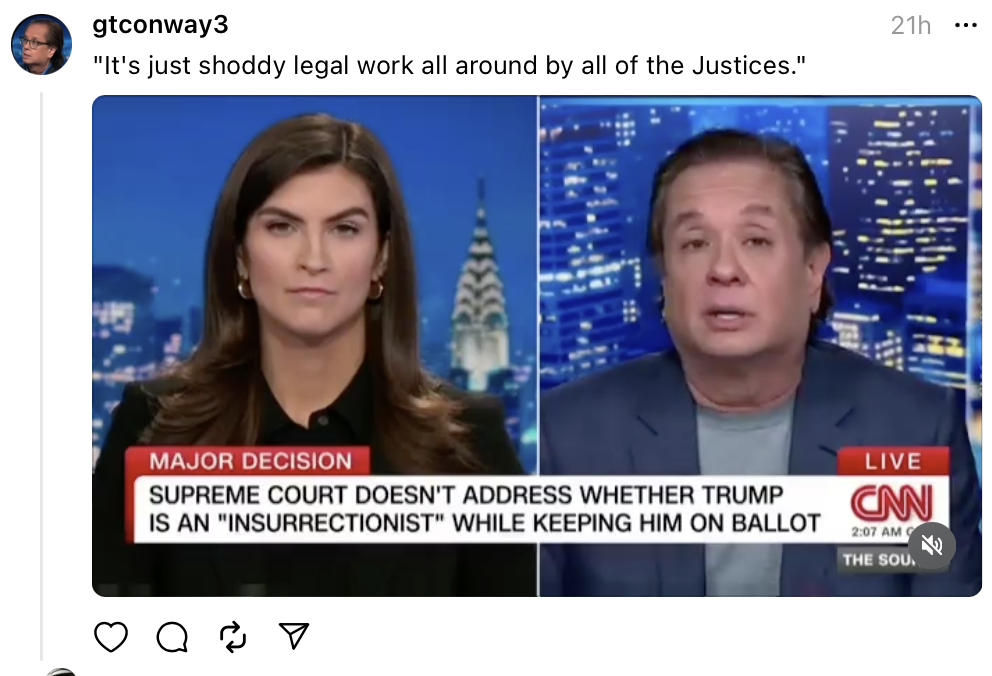
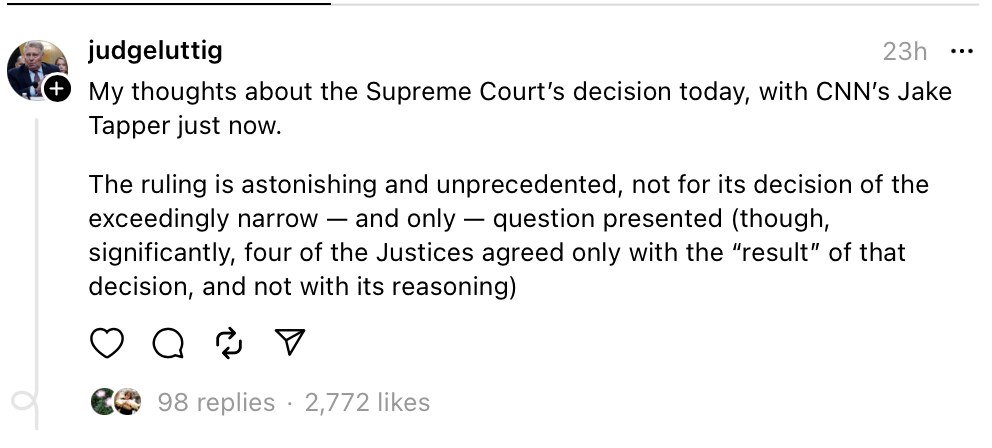
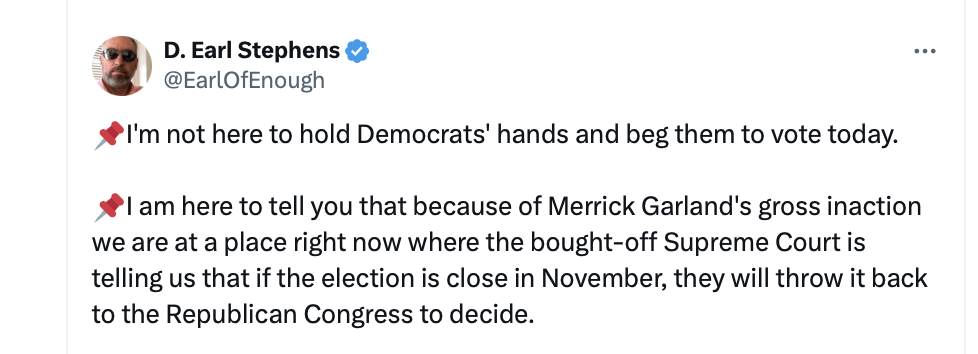
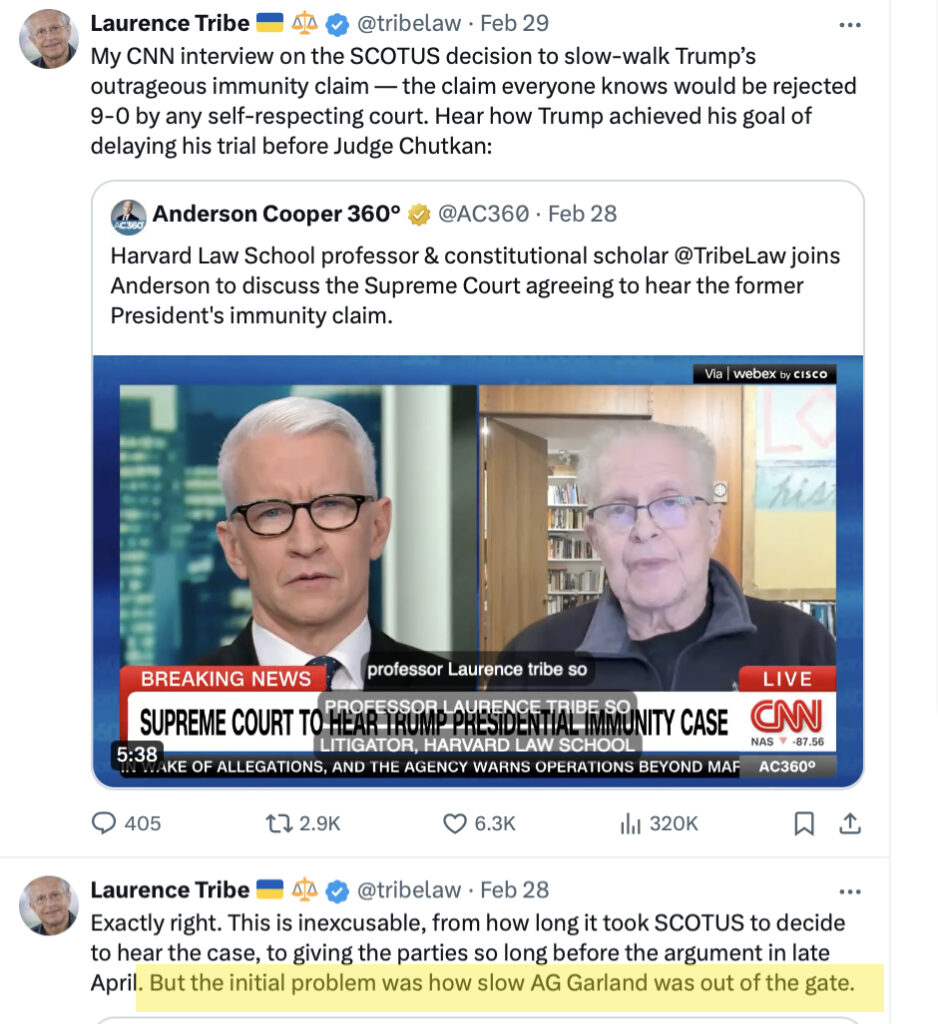
Thank you Teri, My mind feels clean again, as in when I clean the bathroom and everything is sparkling. Hoping this cleaning will last as I navigate news for facts.
I think the whole phenomenon of Trump has so many of us seeking to put it behind us and move on to a healthier national dialog, that these quick fix sound bite types seem to grease the way forward. The damage is done though and it doesn’t help build lasting pro democracy coalition – where we need healthy parties on all sides. Rage is easy, dialog and conversation are hard. Hard is lasting and rage goes on to the next thing.
Regarding the Colorado case, I was always under the impression that Trump was tried for insurrection in the wrong jurisdiction. For that designation to stick and for Article 3 of the 14th Amendment to apply, he would have to be found guilty of an insurrection in a Federal Court – thus he was denied Due Process guaranteed by the 14th Amendment. The conviction for insurrection would be all the “self-activation” needed to kick the article into effect.
Whether “my take” is right or wrong doesn’t matter. The fantastic point Ms. Kanefield makes in this article and in numerous other places in her series, is that making an argument like mine is bad TV/talk radio/micro-blogging. I have experienced this firsthand.
When I would answer the “what do you think question” with what I stated above:
Pro-Trump people would fixate (like REALLY REALLY react) on the insurrection part and would immediately trigger the talking points denying that Jan 6 was anything more than a riot like ANTIFA or BLM did in {insert “liberal” city name here}. This, in spite of the fact that my argument would be a win for Mr. Trump and his supporters.
The Anti-Trump crowd would get confused. They know that I am not a big fan of Mango Mussolini, and they also know that I am an Institutionalist and pro-rule-of-law. Despite all of that, it was cognitive dissonance and a lot of steam coming out of their ears trying to process my answer.
My answer went against their conditioning, but instead of reeling off talking points to try to delegitimize the argument, they moved onto a different subject. (I think I got one comment about Merrick Garland.)
Trump’s talent in all of this is taking something complex (i.e. the Mueller Investigation) and reducing it to a meme (“Russia, Russia, Russia”). Its function is to take the big, ugly pile of paperwork (complexity) and package it into a little envelope that can either be easily tossed away as a show of disdain or picked up like a “get out of jail free” card and invoked as a shorthand to try and win or avoid a difficult discussion whose outcome that person may not like.
I believe that my left-leaning friends were confronted by an argument they could neither process nor fully accept because Trump has become a thing and not a person to them. One of the insidious functions /results of the Outrage machine is to package these arguments so the end-user doesn’t have to expend energy thinking about them nor the conundrum of “no good choice.” They only need the cue (i.e. the word “insurrection”) to make the response. The dude telling me all about ANTIFA and BLM (my standard quip it to ask them to clarify whether they meant Bureau of Land Management or Black Lives Matter) didn’t show one bit of struggle at all and the talking points came out as easily as breathing.
I’m glad I read this and it has helped me understand why my friends and loved ones behave as they do.
Why are we only targeting CNN and MSNBC? Didn’t Fox start the outrage format?
You are engaging in something called “Whataboutism.” It goes like this, “What about Fox?”
This is a propaganda technique that was made famous in the former Soviet Union. No matter what criticism was leveled against the Soviet government, they responded with, “What about racial segregation in America?”
Whataboutism is a way to avoid responsibility and to deflect blame.
“My favorite legal pundits spew misinformation, but what about Fox? They are worse.”
The fact that Fox also spews misinformation doesn’t absolve your favorite legal pundits of responsibility. “They do it,” is not a moral justification for engaging in wrongdoing.
To answer your question, if you read Part II of the series I have posted, you will see that MSNBC and Fox were founded at almost the same time. Even if Fox “started it,” we adults don’t excuse bad behavior by saying “he started it.”
I SO appreciate you! I have yearned to get off the outrage train; you always clarify an issue in a way that is both accessible and extending a hand to step off that train. It’s gradually arriving at my station and I see you there, waiting. Thank you.
I agree with the main thrust of your argument here regarding political punditry, and that the 14th Amendment case did not make any sense as a political matter. However, I think there is something else going on here that makes this case important in a different way, and it has to do with some of the issues you are talking about regarding whether or not the truth is knowable to lay persons.
I agree with you about Laurence Tribe. I used to have great respect for him, but after following him I realized that he doesn’t respect me. I think he is an elitist. I don’t think that he believes that lay persons can understand the Constitution, so he doesn’t bother explaining how it works, he just tells people what conclusions he thinks they should draw. He has decided that what lay people think matters but why they think it does not.
He’s wrong. The choice that he and his colleagues keep making to underestimate the need for laypeople to understand WHY is part of the problem that we have now.
Lay people can read the Constitution and most of us have been exposed to it at some point in our lives. One of the problems that our country has is that many people question whether or not elites are telling them the truth about it.
I have to say something that will sound like partisan position to certain ears. Bear with me.
Nearly every American knows that the First Amendment protects an individual right to freedom of speech. Many of us have read that Amendment, and we’re mostly on the same page about it. (Mostly…)
But then you turn to Amendment number 2, and it says there is a “right to bear arms,” but legal elites have spent decades telling the public that there isn’t any such individual right. Frankly, its hard to square that position with the text that anyone can read, and vague explanations don’t fill the void there.
I think that legal elites underestimate the degree to which they’ve lost credibility with laypeople as a consequence of that specific disconnect – particularly conservatives, of course, but only because this disconnect happens to be about a matter that they care more about than liberals. This loss of credibility makes conservatives particularly vulnerable to people offering alternative answers to them.
The answer that conservative jurists have offered the public is that they are going to be “textualists.” We’re going to do what the text says. Balls and strikes and all that.
Lately, liberals have had to swallow a lot of bitter pills while being told by conservatives that certain outcomes are demanded by the text, and many liberals suspect that these conservative jurists aren’t actually as principled as they claim to be.
But we’re not experts. We’re looking for clarifying moments that help use see whats really going on.
This is why the 14th Amendment case matters. If you were betting on the court disqualifying Trump you really overestimated it. The court was never going to do that. However, I think the case serves a deeper purpose, as a litmus test for lay people regarding the credibility of the Court.
We want to understand WHY they will rule in Trump’s favor.
Lay people can read Section 3 of the 14th Amendment. The question of whether or not it applies to the President is textually murky, but there are pretty straight forward arguments that it does.
We can also read the part that says “Congress may by a vote of two-thirds of each House, remove such disability.” But you’re saying that actually the text hides an “elephant in a mousehole” – that the truth is that Congress may remove such disability by simple majority by failing to enact an implementing statute, and this 2/3rds business is essentially superfluous.
That seems illogical. Were the drafters of the Fourteenth Amendment trying to trick us? This big incongruence requires a pretty clear explanation, and it hasn’t been provided.
Consequently, liberals walk away with the conclusion that conservative jurists don’t actually care about the text. It is ACTUALLY THE CASE that the truth is unknowable because no one really cares about the truth. The judges just care about developing rationalizations for their political outcomes they desire.
I agree that our unraveling confidence in these institutions is bad for our country, but I guess my point is that this unraveling is arising not solely from the disconnect between punditry and reality, but also from the disconnect between what laypeople can see with their own eyes and what they are being told to think by the Court.
I have parted ways with these and other “experts” when they have confidently, and repeatedly asserted that Merrick Garland has dragged his feet, without making the case – a case that could only be made with facts that these “experts” couldn’t possibly have access to.
> Notice one reader’s takeaway:
>> It appears that no one follows the Constitution if it doesn’t fit their political needs.
They are following SCOTUS. SCOTUS now, by and large, uses the “originalism analysis” and that means that if the plain reading doesn’t fit their political needs, they devine “original intent” to be what they think it should be.
QED
Excellent piece, and far better that you stopped redacting names off of public posts. It’s important that people understand who is feeding their outrage and why. Knowing the who, how, and why better equips people to construct their virtual raincoat to protect themselves from not only disinformation, but also the emotional targeting used by the rage merchants.
I think that the ruling is a good one for your “fun reading legal documents” curriculum as it is educational and interesting to drill down and dissect the specific reasoning presented in the majority and concurring opinions without the rage-inducing machinations.
Thank you for your sane commentary, as always! I laughed when I hit this side-comment:
> (This is what is wrong with legal “hot takes.”)
I very much appreciate your approach of laying out the complexities of the questions! I think I am still concerned, as were the concurring opinions, with the majority’s seeming restriction of enforcement mechanisms to legislation; in particular I was hoping that courts rather than Congress could provide enforcement, but I’m not a lawyer, so that was just wishful thinking about what seems less broken at present, rather than any kind of legal reasoning (which I try to understand, but am not qualified to engage in).
I also think that, even beyond the outraged partisan issue du jour, the Supreme Court has a credibility crisis because of Mitch McConnell’s confirmation shenanigans and the justices’ muted response to ProPublica’s reporting about expensive gifts. But we can acknowledge the flaws of an institution and still consider it the best we have at present, and importantly better than abolishing it.
“Allowing Colorado to do this, we agree, would create a chaotic state-by-state patchwork, at odds with our Nation’s federalism principles.”
We already have a state-by-state patchwork. Each state has laws regarding access to the presidential ballot, including alternative mechanisms such as by petition and for independent candidates. It seems odd that the 3 liberal justices would overlook that.
Exactly. I’ve been beating on my teeny, tiny drum for days now. So far, not Constitutional scholars have taken it up. I expected it to be addressed in the opinion, but the opinion is unsigned and even the partial dissent by Sotomayor did not address it. I hope someone with a bigger voice can rattle the cage of someone who actually studies this stuff.
I found a larger drum in The New Republic. They don’t answer tho. They do chastise SCOTUS for ignoring my points. (Vindicated!)
https://newrepublic.com/article/179525/supreme-court-trump-disqualification-clause
This is a completely different case. A presidential candidate only needs (currently) 270 electoral votes to win. There is no Constitutional requirement to run in every state. You just need the electors.
But let’s say Colorado and California individually determine that Trump is ineligible for office, and Trump still gets 270 electoral votes. What happens then? Has a civil war just broken out?
The analogy I like to make is if a Michigan court decided in 2008 that Obama wasn’t born in the US so should be stricken from the ballot. I don’t think the people up in arms right now would have happily said back then “welp, I guess we won’t be winning Michigan.” They would have appealed, and won, on similar grounds.
CO & CA – If tRUmp gets to 270, there will be issues anyway. The Constitution is unambiguously clear on the point.
Obama’s birth – Courts must make decisions based on facts and law. If the facts used are demonstrably wrong, the decision is overturned. I do not think tRUmp will be able to show that his participation in an insurrection was not founded on facts. (Real and not alternative facts.)
Who would overturn the decision? You’ve already argued that the state Supreme Court should have the final say.
Thank you.
I agree that allowing individual states to block a federal candidate could become a nightmarish can of worms. But, then, how *should* our democracy protect itself from concerted efforts to overthrow the rule of law, substituting fascism? Specifically, shouldn’t there be a way to ban an insurrectionist from office?
There are two: Legislation to enforce section 3 and voting them out.
If enough people are willing to vote for Trump and anyone who had a hand in the attack so that he might return to office, we have a problem that no law or court can solve. See my blog post called Parchment Barriers, and the other called Why Some Prefer Oligarchy.
Also, if you are new to my blog, read the Criminal Law FAQ page. It’s under the resources tab on the menu.
There is no Constitutional requirement that the states be consistent. They are already inconsistent. Were they consistent, Ralph Nader would have been on more than 43 ballots, for example. Therefore, if this decision about the unconstitutionality of one state disabling tRump’s candidacy due to insurrection is solid, then other inconsistencies would have to be dealt with as well. What am I missing?
Thank you for this answer. This was what I needed to know: that there IS a way to keep an insurrectionist off the ballot.
I know the House is working on legislation right now. This time around, this specific insurrectionist, I anticipate this bill not passing and it will come down to the election vote, which means, to the electoral college.
I also anticipate an ugly post-election period if Trump is on the ballot, and loses.
The best possible outcome for the country is for the legislation to pass, and Trump be excluded by congress.
It would be even better had he been tried already, and found guilty.
There is this tiny little window, but I have no hope for it.
Thanks for your excellent tutorials, and for opening up the fascinating world of court documents to me.
Thank you for asking this question. It was my ‘need to know’.
As a retired lawyer, and I think I was pretty good at reading cases, I am impressed by Teri’s reasoning and writing. Although I am anti-Trump, I agree with the outcome. But it’s a crazy system. Each state runs their own elections, and they can do all kinds of things like banning drop boxes, imposing all kinds of voting requirments and restrictions, having early voting, restricting early voting, etc. But they can’t keep an insurrectionist off the ballot. But it’s a whacky system. And Roberts, he guts the Voting Rights Act, so states can gerrymander all they want unless it’s explicitly racist, so many things are reserved to the states, but not this. I think it would be crazy to have a candidate of one of the two major parties banned in some states but not others.
The Fourteenth Amendment was specifically about restricting states’ rights in a few, critical areas. Other areas were left to the states, or the Fifteenth Amendment.
One issue I keep asking about and have yet to see an answer on:
Different states have different criteria for who gets on the ballot for president. As a consequence of that, you do not see the same candidates on all ballots across the United Stages. (e.g. Ralph Nader only appeared in 43 of 50 states.)
SO, given that there are already disparities, what is the rationale for distinguishing insurrection participation from other qualifications and instead requiring that that disablement be applied uniformly across the United States? (Sotomayor didn’t say.)
“Democracy requires an educated electorate.” Is an important statement.
The religious right systematically dismantling our education system for decades in an attempt to address their anxiety with perceived threats and “problematic ideas” like evolution and non-hierarchical equality, has had the unintended consequence of producing even less prepared and even less critically thinking voters.
How should our democracy protect itself? The answer is to focus on improved education. We seem to have really dropped the ball on this one.
Imagine if the average American were better prepared to identify and process misinformation, disinformation, biases, conspiracy theories, and emotional manipulation. Imagine if politicians instead had to appeal to and please a much more qualified and knowledgeable voter base that demanded they present logical arguments, built upon verifiable facts.
There is a reason why “the educated elites” are historically vilified by demagogues, and it’s because the old tricks of deception and manipulation are much harder to pull off against an accurately informed, educated, and thoughtful electorate.
Hi Teri! Really appreciate your work, and I am all FOR your naming names whose punditry seems particularly egregious. (Some of them are to legal commentary what Dr. Phil is to serious psychology, and not being an expert in either field, I appreciate trusted sources, in this case YOU, flagging such commentary WITH names.) I stopped watching MSNBC completely when they kicked Mehdi Hasan to the curb, later realizing that their entire structure is “dogs with a chew toy” repeated endlessly (of course I’d watch in a heartbeat if YOU were on, but people like you and Chuck Rosenberg seem to be too non-inflammatory for network tastes).
Edited to add, I’d rather watch JJ with a chew toy than the MSNBC crew with THEIRS.
I still fall for the outrage sometimes, but reading your analysis helps me resist it sometimes, too. I even un-followed Tribe shortly after the Colorado case decision was issued, after spotting the kinds of tendencies you’ve described in prior writing without singling him out. I also became increasingly bothered by his tendency to re-post “inspiring” little clips and blurbs that are rather easily spotted as fake or staged. Those didn’t reflect well on his ability to discern between credible and un-credible sources.
Possible typo: Where it says “Trying to explain that there are provisions of the Constitution that do need legislation to be enforced would solve the underlying problem…”, I think there’s a “not” missing between “would” and “solve”, given the sentence that follows.
Agreed on the typo.
Thank you Teri. I value truth and a level head.
I will gladly take wisdom and clarity over outrage any day.
Thank you, Teri.
I am a natural skeptic, it’s in my DNA. Because of that I long ago gravitated to trusting science more than most human endeavors. Even if science is done by humans with all their fallacies, at least the goal is a process that acknowledges this and works to negate it however often it may fall short. Didn’t take long for me to understand what politics and religion were all about. Thus what I most admire about your work is your emphasis on clear data, clear understandings about How Things Work (in the legal/court domain). The phrase Knowledge Is Power is true about this domain. So many of our fellow citizens would get a tremendous civics lesson were they suddenly involved in the legal process. Justice does not work like it’s shown on TV, or on Facebook, Twitter, etc. Thank you for the effort you take to educate us. I for one very much appreciate it.
Thank you.
I couldn’t agree more with your assessment of cable news these days. I’m a pretty liberal democrat and I don’t watch MSNBC anymore. It’s a network devoted to trying to figure out what I want to hear and then screaming it to me. BBC America and PBS are my primary channels of news these days
I stopped watching MSNBC also. After the 2016 election I was glued to it from the time I got home from work until I went to bed. I need to hear people, “experts”, telling me what I needed to hear. I don’t even know what I wanted to hear, probably how terrible Trump was and any day now he would get what he deserved. Now, I can’t stomach watching the news, even Rachel. All they do it try to scare people, then tell them it will be okay because …….. whatever the reason. Of course I haven’t gotten completely off social media which is worse, and I spend way too much time doomscrolling. I’ve convinced myself Trump will win in November, I’m almost paralyzed with anxiety, and I know it’s irrational but I can’t stop myself.
What you just wrote describes me to a tee. I was addicted to MSNBC. I adored Rachel Maddow. She helped keep me sane.
And then she promoted a story about Merrick Garland and sending out a memo to DOJ before the election in 2022 that said that any new investigations of someone running for office needs to go past him or someone close to him in authority. She presented it will breathless excitement, like she got a scoop. “He’s interfering in the election!”
And then I found out that this has been SOP for many years at DOJ.
The spell with her was broken.
I tried to watch again a few months ago. She just kept waving her latest book in the camera, talking about how great it is. I lost all respect. I have yet to watch her again.
I will say, though, I disagree about Trump winning. I know we don’t know until we know, but I don’t see why the American people would return to office the person they threw out, particularly when we threw him out BEFORE Jan. 6 happened. And while I have been angry about the Supreme Court taking up the immunity case and delaying the Jan. 6 trial more, perhaps having that case running at the time of the election will be a good reminder of what happened that day for those Americans who have memory issues about how bad Trump was and is.
My fear is that we won’t have the turnout we had in 2020, add to that RFK Jr. and that No Labels nonsense, I fear we are in for a rough time. But I hope not!
I agree; I watch certain shows on MSNBC because I want their analysis, but most shows pre-noon (west coast) have become unwatchable. I remind myself that everything’s on repeat because they never know when a new person will tune in and need to be caught up, but it’s gotten too much.
I miss the Walter Cronkite days (yes, I’m old). The news, given in a matter-of-fact manner. I know that back then we didn’t know as many facts as we do now thanks to the Internet and 24/hr news, but there wasn’t so much noise and chaff in the air to sort through.
Political institutions are becoming more discredited———from both sides of the political divide.
It is time to build a new way.